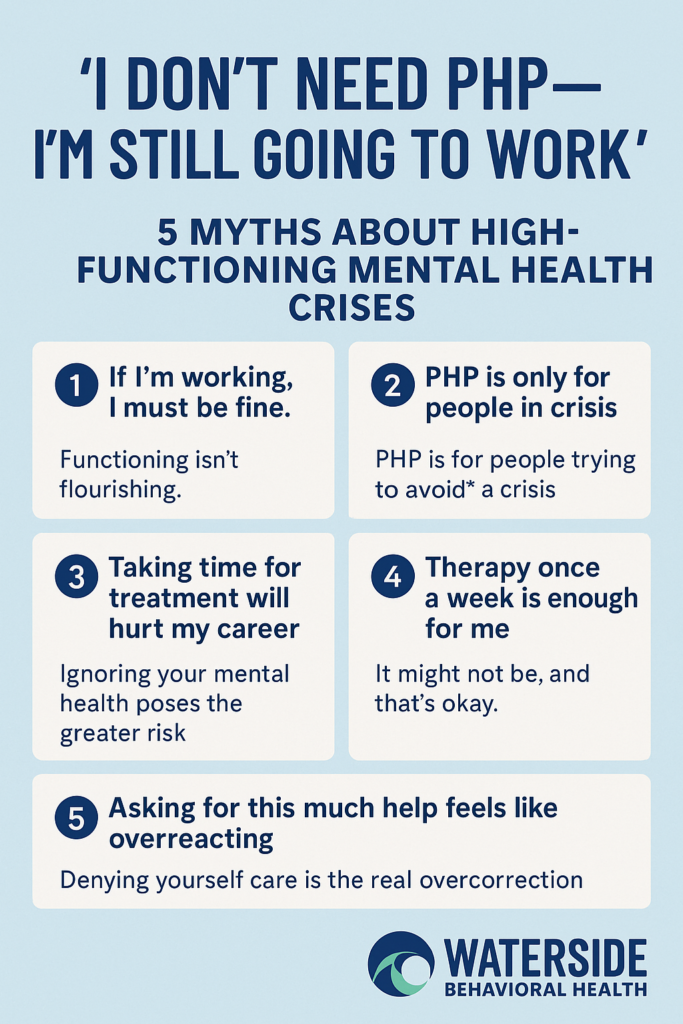Holding it together doesn’t always mean you’re okay. Many high-achieving professionals push through symptoms of anxiety, depression, or burnout simply because they can—until something cracks. But needing help doesn’t mean you’re weak, and it certainly doesn’t mean you’ve failed. It means you’re human.
Let’s clear up five persistent myths about Partial Hospitalization Programs (PHP) and what it really means to seek help when things are hard but hidden.
Myth #1: “If I’m working, I must be fine.”
Truth: Functioning isn’t flourishing.
Being able to show up doesn’t always mean you’re okay. You might be sending emails, managing a team, or parenting without missing a beat—but still feeling numb, anxious, or barely holding it together inside. High-functioning mental health issues are deceptive. They often don’t stop you from getting things done, but they chip away at your well-being silently. PHP isn’t just for people who can’t get out of bed. It’s for people who are getting out of bed and still suffering.
Think of PHP as an active recovery space for people who are outwardly successful but inwardly struggling. The program helps you not just survive your day, but feel present, stable, and supported again.
Myth #2: “PHP is only for people in crisis.”
Truth: PHP is for people trying to avoid a crisis.
Waiting until you “break” isn’t a badge of honor. Many people delay help because they think they have to hit rock bottom before they qualify for support. But PHP is actually designed to prevent hospitalization and worsening symptoms. It provides intensive, structured care without requiring an overnight stay.
This makes PHP especially valuable for people who are starting to notice that their usual coping strategies aren’t cutting it anymore. If your sleep is off, your mood is unpredictable, or your relationships are under strain, PHP can be a proactive and empowering step—not a last resort.
Myth #3: “Taking time for treatment will hurt my career.”
Truth: Ignoring your mental health poses the greater risk.
You may feel like stepping away for treatment is a professional risk—but untreated mental health issues often lead to burnout, absenteeism, or sudden breakdowns that really disrupt your career.
Many PHP programs run during business hours, and that can be a hurdle—but it’s a short-term commitment with long-term payoffs. Communicating with HR or using FMLA (Family Medical Leave Act) protections can provide a way to take care of yourself without jeopardizing your role.
High performers don’t wait until the wheels come off. They recognize when maintenance is needed. PHP is that maintenance for your mind.
Myth #4: “Therapy once a week is enough for me.”
Truth: It might not be, and that’s okay.
Once-weekly therapy is a great starting point—but it may not offer enough containment when symptoms intensify or when you’re dealing with multiple life stressors. PHP includes several hours of care each day: individual therapy, group work, skill-building sessions, and sometimes psychiatric support.
Think of it like this: if you’re barely staying afloat, do you want a lifebuoy or a rescue boat? PHP offers that extra support without requiring you to leave your life behind.

Myth #5: “Asking for this much help feels like overreacting.”
Truth: Denying yourself care is the real overcorrection.
Self-reliance is admirable—until it turns into self-neglect. Many high-functioning individuals minimize their symptoms because they don’t “look” sick or because they fear being seen as dramatic.
But mental health isn’t about how things appear on the outside. It’s about how you feel, function, and relate on the inside. If your day is filled with dread, exhaustion, or detachment, you deserve care. Not judgment.
PHP offers a space where you don’t have to perform strength. You just get to be real.
Why PHP Works for High-Functioning Professionals
Partial Hospitalization Programs offer:
- Daily support without overnight stays
- Access to therapists, psychiatrists, and peer groups
- A structured path to healing with measurable outcomes
- Time-limited care that helps you stabilize, then step down
It’s ideal for people who need more than talk therapy but aren’t in crisis. If you’re feeling overwhelmed but still functioning, PHP can help before things fall apart.
FAQ: Partial Hospitalization for Mental Health
What is a Partial Hospitalization Program (PHP)?
A PHP is a structured, intensive mental health program that offers clinical support during the day without requiring you to stay overnight. It’s often used to treat moderate to severe mental health conditions that need more than outpatient therapy.
How long does a PHP last?
Programs typically run 5 days a week for about 4–6 hours per day, lasting between 2 to 6 weeks depending on individual needs.
Can I work while in a PHP?
Some clients adjust their work hours or take medical leave during PHP. While the schedule can be demanding, many professionals find ways to integrate PHP without losing their job.
Is PHP covered by insurance?
Yes, most commercial insurance plans and Medicaid cover PHP services. It’s best to verify coverage with your provider or ask the treatment center for help navigating benefits.
What happens after PHP?
After completing a PHP, clients typically transition to an Intensive Outpatient Program (IOP) or continue with individual therapy to maintain progress.
Ready to Take the First Step?
If you’re tired of holding it all together and ready to feel better—not just look okay—you don’t have to do it alone. A Partial Hospitalization Program in Massachusetts might be the next right step.
📞 Call us at (774) 619-7750 to learn more. We’ll talk with you about your options, your schedule, and what support could look like.
You’re not overreacting. You’re reaching for better.




